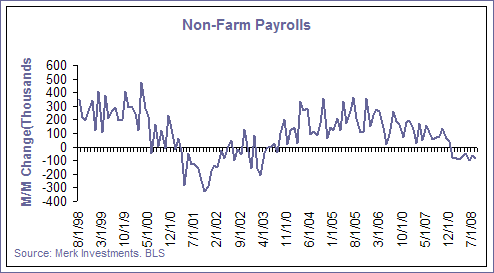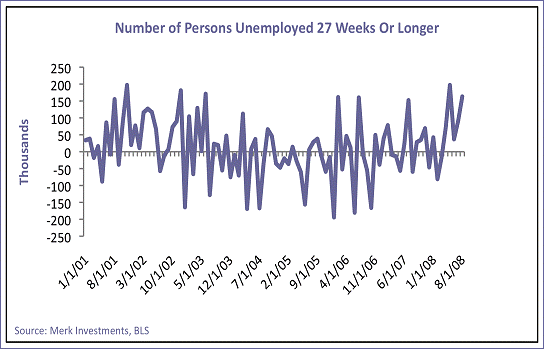US Employment Picture: September Non-Farm Payrolls Forecast
Economics / US Economy Oct 02, 2008 - 11:09 AM GMTBy: Joseph_Brusuelas

 The upcoming release of the September non-farm payrolls report by the Bureau of Labor Statistics will not provide much comfort to the market or the public. Our forecast implies that payrolls will decline -105K and that the rate of unemployment will increase to 6.2% for the month. The strike at Boeing and the displacement of workers in the Southeast due to the twin hurricanes that hit the area during the sampling period should send the headline estimate of job losses above the recent trend. The risk for the report is to the downside and we do expect that the rate of job destruction will increase in the coming months.
The upcoming release of the September non-farm payrolls report by the Bureau of Labor Statistics will not provide much comfort to the market or the public. Our forecast implies that payrolls will decline -105K and that the rate of unemployment will increase to 6.2% for the month. The strike at Boeing and the displacement of workers in the Southeast due to the twin hurricanes that hit the area during the sampling period should send the headline estimate of job losses above the recent trend. The risk for the report is to the downside and we do expect that the rate of job destruction will increase in the coming months.
Thus far 650K jobs have been lost during the year. The troubles in the housing sector and the now yearlong crisis in the credit market have begun to spillover into the broader economy. We anticipate that autoworkers and individuals in the technology sector, especially those in the work in computers may see an increase in unemployment in September and in the coming months.

We base this forecast on the growing evidence that that weakness in the manufacturing and goods producing sector has spilled over into the once potent service sector. We anticipate that close to half of all losses will occur in the manufacturing sector with the service sector seeing a fourth straight month of declines, in addition the weakness in the goods producing sector. Outside of the positive contributions from the government and the healthcare sector, the labor picture is in the process of moving in a decisively negative direction.
The deterioration in the unemployment picture is equally bleak. The sharp jump in the rate of unemployment in August was characterized by an increase in the duration of unemployment of 27 weeks or longer. Over the past year the number of unemployed individuals has increased by 2.2 million, while the unemployment rate jumped 1.4% over that same period, 1.3% over the past six months and 0.4% in August alone. During the post war period, each time the rate of unemployment has increased by 1.0% during a twelve-month period the economy proved each time to be in recession. Based on the most recent data we have updated our forecast on the rate of unemployment to 6.9% by mid 2009.

Looking forward, the September jobs report will not capture the recent intensification of the credit market and the complete seizing up of the short-term market for money. Firms that rely on the credit markets to roll over short-term debt and meet bi-monthly payrolls may find it increasingly difficult to do so. If the current financial crisis turns into an economic event, the market should ready itself to observe a far sharper dislocation in the workforce than is currently assumed. Thus, if the credit markets remain frozen well into October, there is a definitive risk that culling of the labor force will pick up beyond our provisional expectation of losses through the end of the year in the job sector of up to 150k per month.
By Joseph Brusuelas
Chief Economist, VP Global Strategy of the Merk Hard Currency Fund
Bridging academic rigor and communications, Joe Brusuelas provides the Merk team with significant experience in advanced research and analysis of macro-economic factors, as well as in identifying how economic trends impact investors. As Chief Economist and Global Strategist, he is responsible for heading Merk research and analysis and communicating the Merk Perspective to the markets.
Mr. Brusuelas holds an M.A and a B.A. in Political Science from San Diego State and is a PhD candidate at the University of Southern California, Los Angeles.
Before joining Merk, Mr. Brusuelas was the chief US Economist at IDEAglobal in New York. Before that he spent 8 years in academia as a researcher and lecturer covering themes spanning macro- and microeconomics, money, banking and financial markets. In addition, he has worked at Citibank/Salomon Smith Barney, First Fidelity Bank and Great Western Investment Management.
© 2008 Merk Investments® LLC
The Merk Hard Currency Fund is managed by Merk Investments, an investment advisory firm that invests with discipline and long-term focus while adapting to changing environments. Axel Merk, president of Merk Investments, makes all investment decisions for the Merk Hard Currency Fund. Mr. Merk founded Merk Investments AG in Switzerland in 1994; in 2001, he relocated the business to the US where all investment advisory activities are conducted by Merk Investments LLC, a SEC-registered investment adviser.
Merk Investments has since pursued a macro-economic approach to investing, with substantial gold and hard currency exposure.
Merk Investments is making the Merk Hard Currency Fund available to retail investors to allow them to diversify their portfolios and, through the fund, invest in a basket of hard currencies.
Joseph Brusuelas Archive |
© 2005-2022 http://www.MarketOracle.co.uk - The Market Oracle is a FREE Daily Financial Markets Analysis & Forecasting online publication.


